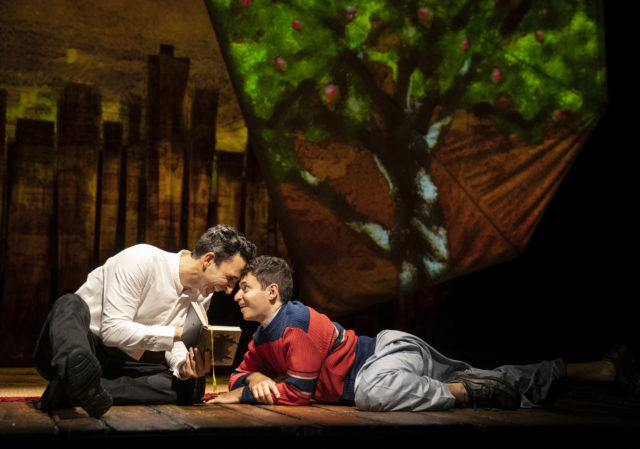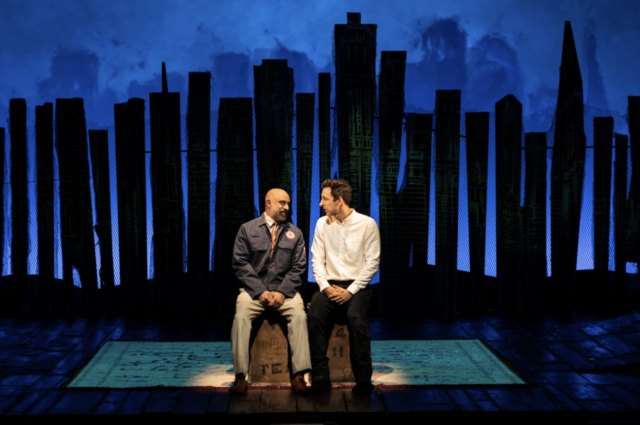
Amir (Amir Arison) reads a story to Hassan (Eric Sirakian) in The Kite Runner (photo by Joan Marcus)
THE KITE RUNNER
Hayes Theater
240 West 44th St.
Tuesday – Sunday through October 30, $69-$199
thekiterunnerbroadway.com
The third time is not a charm for The Kite Runner.
Khaled Hosseini’s bestselling 2003 debut novel sold more than seven million copies in the United States. Director Marc Foster and screenwriter David Benioff’s 2007 film version was nominated for two Golden Globes, including Best Foreign Language Film, and for a Best Original Score Oscar. But Matthew Spangler’s 2009 theatrical adaptation, which opened July 21 at the Hayes Theater on Broadway, fails to live up to the promise of its forebears, rarely taking flight.
The play begins in San Francisco in 2001, with Amir (Amir Arison) explaining to the audience, “I became what I am today at the age of twelve. I remember the precise moment, crouching behind a mud wall on a frigid winter day in 1975 . . . peeking into a deserted alley. It’s wrong what they say about the past, about how you can bury it, because the past claws its way out.” For more than two and a half hours (plus intermission), Amir serves as both narrator and character, portraying himself from an Afghan child in 1973 to an adult in California. The story is told in scenes that are treated like individual set pieces that often merely depict what Amir has already described instead of offering more; when he is not in the scene itself, he is an observer, not taking action, which becomes the core of the plot.
The young Amir lives in Kabul with his father, Baba (Faran Tahir), a proud, moralistic, successful merchant; Amir’s mother died in childbirth, and he hasn’t remarried. Baba’s longtime devoted servant, Ali (Evan Zes), stays in a shack on the estate with his young son, Hassan (Eric Sirakian), who spends most of his time playing with Amir; Ali’s wife ran off with a troupe of actors and musicians years before. Amir and Hassan can’t necessarily be called friends because as Sunni Muslims and members of the Pashtun ethnic group, Amir and Baba are of higher status than Ali and Hassan, who are ethnic Hazaras and Shi’a.
Hassan loves listening to Amir reading stories to him, primarily from Ferdowsi’s tenth-century Persian epic poem Shahnamah; Amir wants to become a poet himself, which angers his father, who wants a tough, athletic son who can defend himself against bullies. “Real men don’t read poetry, and they certainly don’t write it! Real men play soccer, just like I did when I was your age!” Baba bellows. Baba tells his business partner, Ramir Khan (Dariush Kashani), “A boy who won’t stand up for himself becomes a man who can’t stand up to anything.”
Amir is determined to win the annual winter kite-fighting tournament, in which contestants try to cut the lines of everyone else’s kites, then have their runner track down the final fallen kite. Amir is one of the best kite cutters, but Hassan, who is devoted to Amir, is considered the greatest kite runner around. At the end of the competition, Hassan, in possession of the last kite, is confronted by neighborhood bully Assef (Amir Malaklou) and his cohorts, Wali (Danish Farooqui) and Kamal (Beejan Land). Ali demands that Hassan hand over the kite, but the young boy refuses, determined to bring it to Amir no matter the cost. As Assef commits a horrific act against Hassan, Amir watches, doing nothing, then runs away. “I ran as fast as I could. I ran all the way home,” the older Amir remembers sadly.

Baba (Faran Tahir) offers advice to his son (Amir Arison) in Broadway debut of The Kite Runner (photo by Joan Marcus)
The event, which the two boys never talk about, leads Amir to manufacture an estrangement; Ali and Hassan leave the estate, much to Baba’s displeasure. In 1978, Baba and Amir sacrifice everything following the Soviet invasion, first escaping to a refugee camp in Pakistan, then starting all over in San Francisco. In 1984, Amir and Baba are selling junk at a flea market in San Jose when Amir meets Soraya (Azita Ghanizada), the daughter of General Taheri (Houshang Touzie), who has also been reduced to selling random wares at the market. Amir and Soraya fall in love, but he is still haunted by how he treated Hassan. When Ramir discloses what has become of Ali and Hassan, Amir is determined to right the wrongs of his past, even if it means risking his life.
The Kite Runner is laden with the shame Amir is burdened with, and its heaviness weighs down the show. Too many of the scenes are extraneous or go on for too long; for example, a wedding might introduce us to certain aspects of Afghan culture, but it adds little to the narrative. The first act does a decent job of setting up what is to come, but the second act is an avalanche of incredulity and melodramatic coincidence that quickly grow tedious.
Spangler (Albatross, Operation Ajax), who has also adapted T. C. Boyle’s The Tortilla Curtain, Mary Manning and Sinead O’Brien’s Striking Back: The Untold Story of an Anti-Apartheid Striker, and Hanan al-Shaykh’s The Story of Zahra, among other books, tries to include too much of the novel, so the plot meanders, getting stuck in the trees till it finally comes crashing to the ground. Director Giles Croft (Tony’s Last Tape, The Understudy) is unable to untangle the tale, which takes place on Barney George’s spare stage, anchored by an uneven wooden picket fence in the back on which William Simpson projects images.
Throughout most of the show, Salar Nader plays the tabla, sitting at the sides of the stage, adding to the Central Asian mood. Arison (The Blacklist, Aftermath) has difficulty navigating the time jumps as the unreliable narrator, delivering important facts at too slow a pace. Tahir, who recently played Othello and Richard III, brings a Shakespearean majesty to Baba, while Touzie (The Tibetan Book of the Dead, From Satellite with Love) is strong as the once-powerful general and Sirakian (The Jungle, Pericles) is more effective than Arison in portraying a child.
Spangler and Croft touch on key issues, from bigotry and immigration to bullying and the Taliban, but they feel less central to the plot than they did in the book, even in the wake of the controversial US pullout from Afghanistan in 2001; the name of the play refers to Hassan, but it is all about Amir, an unsympathetic character who is difficult to stick with in this disappointing adaptation.